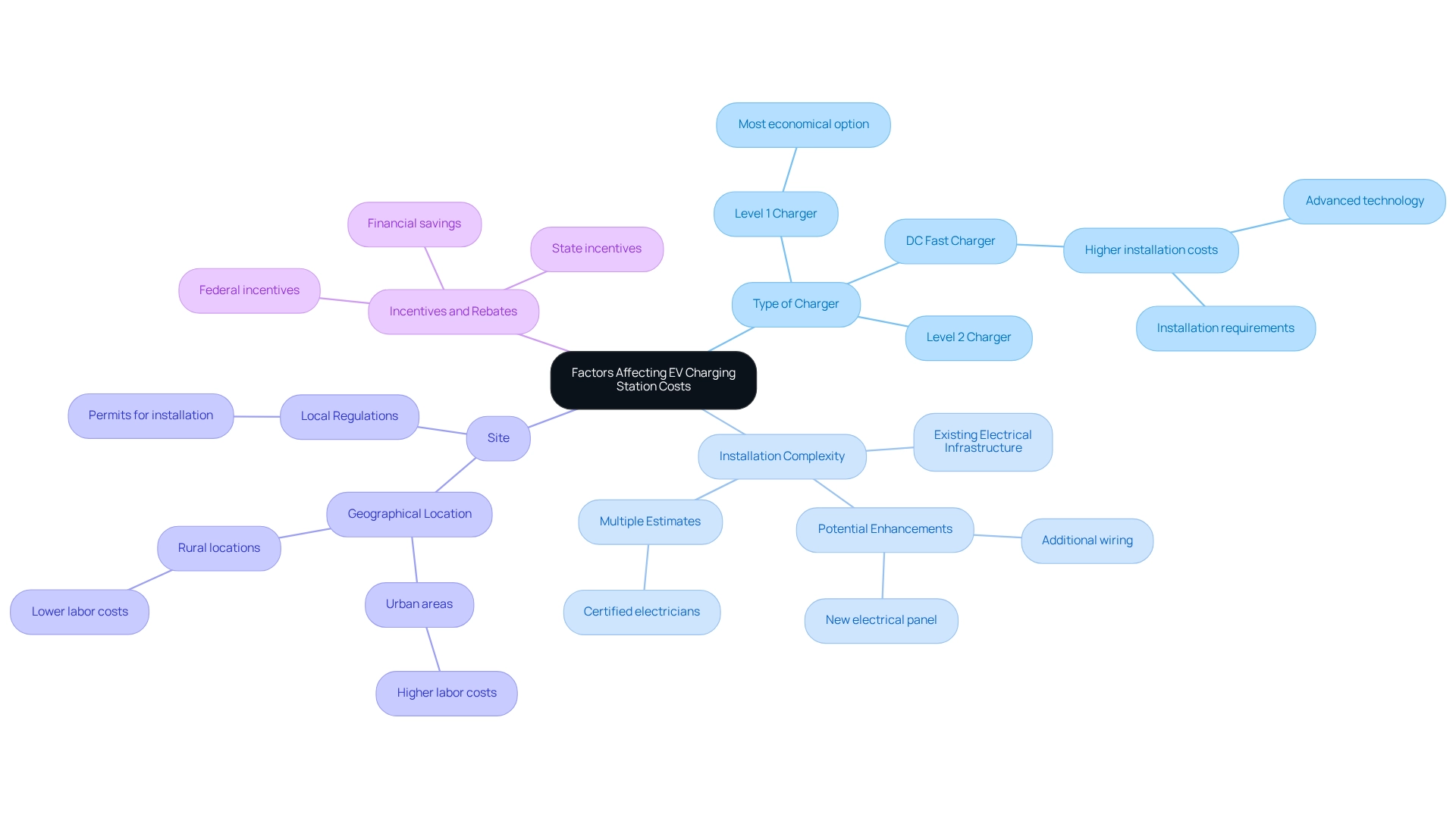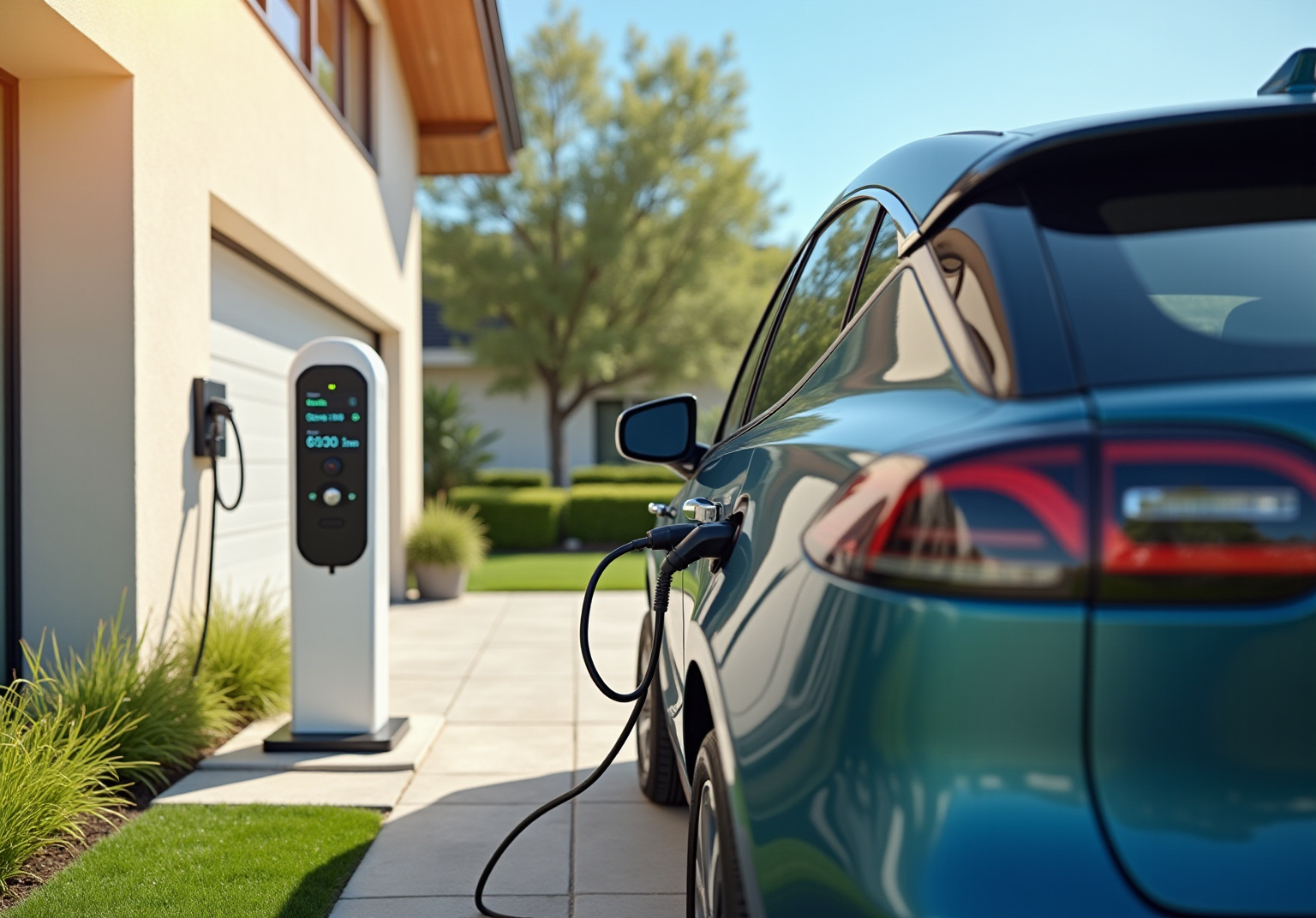Overview
We understand that managing energy costs can be a significant concern for homeowners today. The article sheds light on the various expenses associated with electric vehicle (EV) charging stations, exploring the key factors that influence these costs and the potential savings that can benefit you. It’s important to recognize that these expenses can vary widely based on the type of charger you choose, the complexity of the installation, the location of your home, and the incentives that may be available to you.
As you consider the long-term financial benefits of home charging, it becomes clear that the initial setup expenses can be outweighed by the savings on energy bills and reduced maintenance costs. Imagine the peace of mind that comes with knowing you’re not only saving money but also contributing to a more sustainable future. Together, we can explore these options and find the best solutions for your energy needs.
In conclusion, the journey towards energy independence through EV charging stations is not just about the costs; it’s about the potential for a brighter, more sustainable future. If you have any questions or need guidance, please don’t hesitate to reach out. We’re here to support you every step of the way.
Introduction
As we collectively navigate the shift towards more sustainable energy solutions, electric vehicles (EVs) are increasingly becoming a familiar presence on our roads. We understand that the transition to EV ownership can raise several concerns, particularly regarding charging infrastructure.
It’s essential for homeowners to grasp the different types of electric vehicle charging stations—ranging from basic Level 1 chargers to advanced DC Fast Chargers—to make informed decisions that align with their needs.
This article explores the intricacies of EV charging stations, shedding light on the factors that influence installation costs, the long-term savings associated with home charging, and the ever-evolving landscape of charging technology.
With the right knowledge and support, homeowners can enhance their driving experience and contribute to a greener future together.
Explore the Basics of Electric Vehicle Charging Stations
Electric vehicle refueling stations are essential for powering electric cars, and they come in three primary types that cater to different needs:
- Level 1 Chargers: These basic chargers connect to a standard 120-volt outlet, making them suitable for overnight power replenishment. However, we understand that they can take a considerable amount of time to fully charge a vehicle, often requiring up to 12-24 hours depending on the battery size.
- Level 2 Chargers: Using a 240-volt outlet, Level 2 chargers significantly reduce power-up duration, making them ideal for residential setups. They can fully charge a vehicle in just a few hours, providing a practical solution for daily use. Approximately 70% of homeowners choose Level 2 chargers due to their efficiency and convenience, which aligns with the goal of reducing energy bills and fostering energy independence.
- DC Fast Chargers: Typically found at public power stations, these devices can power a vehicle to 80% in roughly 30 minutes. However, it’s common to feel overwhelmed by their elevated setup expenses, including electric charge station costs and energy demands, which often exceed tens of thousands of dollars, making them unsuitable for residential use. Consequently, they are mainly accessible in public spaces, with the Northwest area witnessing a significant 13% rise in public power infrastructure in Q3 2023.
Understanding these types of chargers is crucial for homeowners to select the appropriate option based on their driving habits and energy needs. For example, while Level 1 chargers may suffice for those with minimal daily driving, Level 2 chargers offer a more efficient solution for regular use. Moreover, public power stations, which include a combination of Level 2 and DC Fast Chargers, play a vital role in supporting EV owners without home power sources, enabling long-distance journeys and promoting the wider acceptance of electric vehicles.
As the electric vehicle market continues to grow, trends in power technology for 2025 indicate improvements in speed and efficiency, further enhancing the appeal of home setups. Selecting a trustworthy power supply provider can ensure effective installation and optimize return on investment, making it a crucial factor for homeowners eager to embrace electric vehicle technology while considering the electric charge station cost. Together, we can navigate this transition towards a more sustainable future.
Analyze Key Factors Affecting EV Charging Station Costs
As you consider the electric charge station cost for setting up an EV power station, it’s important to recognize the numerous essential elements that can greatly impact your investment:
- Type of Charger: Choosing between Level 1, Level 2, and DC Fast Chargers is crucial. Level 1 chargers are the most economical, but the electric charge station cost for DC Fast Chargers, which are designed for rapid charging, may lead to significant expenses due to their advanced technology and installation requirements.
- Installation Complexity: The complexity of the installation can vary significantly based on your existing electrical infrastructure. If enhancements are needed—like installing a new electrical panel or additional wiring—this can increase the electric charge station cost. We encourage homeowners to assess their current setup to anticipate potential expenses and consider obtaining multiple estimates from certified electricians for efficient management.
- Site: The geographical location and accessibility of the installation area can also affect labor costs. Typically, urban areas may incur higher electric charge station costs compared to rural locations because of increased demand and labor rates. Local regulations often necessitate permits for installation, which can contribute to the overall electric charge station cost. It’s essential for homeowners to familiarize themselves with local codes and requirements before proceeding, as this can help avoid unexpected costs.
- Incentives and Rebates: There are various federal and state incentives available to help reduce setup costs. Investigating these programs is vital for homeowners to explore all available financial incentives, as they can lead to substantial savings on installation expenses.
Understanding these elements allows you to make informed choices about your EV station installation, ultimately leading to a more efficient and cost-effective setup. Additionally, with 80% of EV operators expressing a preference for the convenience of at-home refueling, investing in a residential charging solution is becoming increasingly appealing. At Powercore Electric, we offer comprehensive support, including solar panels and battery backups, to enhance the efficiency of your EV power setup. Together, we can work towards a sustainable future that empowers your energy independence.

Break Down Installation Costs for EV Charging Stations
We recognize that the electric charge station cost can be a significant concern for homeowners. It’s important to consider various factors that can influence the electric charge station cost, such as equipment costs: the price of the charging unit can vary widely, from around $300 for a basic Level 1 charger to over $50,000 for a high-end DC Fast Charger.
- Labor Costs: Installation labor typically ranges from $500 to $2,000, depending on the complexity of the installation and local labor rates.
- Electrical Upgrades: If your home requires electrical enhancements, such as a new panel or additional wiring, this could add $1,000 to $5,000 to your total expenses. At Powercore Electric, we conduct a thorough site assessment to determine the best location for your charging station and evaluate any electrical requirements, ensuring that all necessary upgrades are identified.
- Permits: Depending on local regulations, permits can cost anywhere from $100 to $500.
Overall, homeowners can expect to spend between $1,000 and $10,000 for a complete setup, which includes the electric charge station cost, depending on the factors mentioned above. Rest assured, after installation, Powercore Electric thoroughly tests the station to ensure it’s operating at peak performance before delivering it to you.
Together, we can navigate these expenses and work towards achieving energy independence, ensuring you feel supported every step of the way.
Evaluate Long-Term Costs and Savings of EV Charging
Understanding the long-term expenses and savings associated with the electric charge station cost is crucial for homeowners concerned about their energy bills. Charging an electric vehicle (EV) at home is often more economical than refueling a gasoline vehicle. In California, the average cost to power an EV at home is approximately $0.13 per kWh, resulting in a total expenditure of about $5 to $10 for a full charge. This cost-effectiveness can be a significant relief for those looking to lower their energy bills.
Moreover, electric vehicles generally incur lower maintenance costs compared to traditional gasoline vehicles. With fewer moving parts and no need for oil changes, EV owners can save hundreds of dollars annually on maintenance. This financial benefit adds to the appeal of making the switch to electric.
Additionally, homeowners can take advantage of federal tax credits that cover up to 30% of the expenses for EV power supply systems. This financial incentive can greatly alleviate the initial costs associated with installing residential power solutions, specifically the electric charge station cost. Powercore Electric is here to provide professional setup services, ensuring you can maximize these benefits. Installing an EV charging station not only enhances your home’s convenience but can also increase its real estate value, as more buyers are seeking homes equipped with charging capabilities. This trend reflects a growing market preference for sustainable living solutions, and Powercore Electric’s expertise in solar panel and battery backup installations can further enhance your property’s appeal while also considering the electric charge station cost. Ultimately, the total cost of ownership reveals that the cumulative savings from reduced fuel and maintenance costs can outweigh the initial installation expenses. By incorporating solar energy solutions, like those offered by Powercore Electric, you can maximize your savings while contributing to a more sustainable future.
In summary, the financial advantages of home EV charging extend well beyond immediate savings, paving the way towards a more sustainable and economically viable future for homeowners. Together, we can explore these options and work towards energy independence.
Conclusion
The transition to electric vehicles isn’t merely about driving a different type of car; it’s about understanding the vital infrastructure that supports this significant shift. We recognize that many homeowners may feel uncertain about how to navigate this change. By exploring the various types of EV charging stations—from the basic Level 1 chargers to the more efficient Level 2 and the rapid DC Fast Chargers—homeowners can make informed choices that truly suit their driving habits and energy needs. The right charger can facilitate a seamless driving experience while contributing to a more sustainable future.
Cost considerations can understandably weigh heavily on the decision-making process for EV charging station installations. Factors such as the type of charger, installation complexity, location, and available incentives can all influence the overall expense. Understanding these variables empowers homeowners to plan effectively and take advantage of potential savings, ensuring that their investment in EV technology is both practical and financially sound.
Moreover, long-term savings and the environmental benefits of electric vehicle ownership further reinforce the appeal of home charging solutions. The reduced costs associated with electricity, maintenance, and potential tax incentives position EV ownership as a wise economic choice. Additionally, the enhancement of property value through the installation of charging stations aligns perfectly with the growing demand for sustainable living solutions.
In conclusion, embracing electric vehicle technology is a multifaceted journey that goes beyond simply purchasing an EV. By equipping homes with the right charging infrastructure and understanding the associated costs and benefits, homeowners can enhance their driving experience while contributing to a greener, more sustainable future. We understand that as the landscape of electric mobility continues to evolve, staying informed and proactive is essential. Together, we can fully realize the advantages of this transformative shift in transportation.


